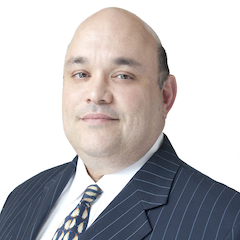RIMS-CRMP Stories
Manny Padilla: The Uniqueness of the RIMS-CRMP Certification

RIMS Treasurer Manny Padilla discusses how earning his RIMS-CRMP was part of his overarching and continuous professional development journey.
RIMS: What inspired you to pursue the RIMS-CRMP?
Padilla: Throughout my career I have taken designation and certificate courses to develop my professional expertise in the risk management discipline. The RIMS-CRMP certification is unique in that it is ANSI accredited, which was one of the primary factors in pursuing this certification.
RIMS: You’ve been with MacAndrews & Forbes for more than 32 years and have consistently moved up the ranks to vice president of risk management. How did your career experience lend itself as a knowledge base for taking the exam?
Padilla: In a number of ways. MacAndrews has always been in the acquisition mode, and most recently, the divestiture mode. Following the five domains and competencies of the RIMS-CRMP has served as a guide for managing these events and extends into the day-to-day management of the job role.
There was a time when these specific activities were not defined in a recognized risk process and tasks were performed by experienced professionals after experimenting with a variety of different approaches.
Using a recognized model allows for a more efficient execution of the process and most importantly, focuses you on where there may be opportunities and deficiencies in your approach.
Ultimately, the five domains and core competencies provided applicable knowledge and skillsets needed to prepare for the RIMS-CRMP.
RIMS: Did some of the questions or scenarios of the exam remind of you of your daily work, or even your time as a Coast Guard Auxiliarist?
Padilla: Yes. The Coast Guard Auxiliary is a volunteer branch of the active Coast Guard. We also get involved in operational areas which are not law enforcement based.
Risk management as a subject has always been front and center in the operational area and required for certification and evaluation. Some of the operational job classifications require annual risk management situational awareness training. There is also a structured Risk Management course on operational issues. I have just recently updated my completion of the full course in parallel with the RIMS-CRMP study process.
RIMS: In what ways did your employer support you in preparing for the exam?
Padilla: MacAndrews & Forbes supports my training and education activities. They allow time for and fund a good portion of these costs.
RIMS: You are well known in the profession and the risk community. Why should other risk leaders who are similarly well established take the exam? How do you believe it will benefit them?
Padilla: I would break out the response into two broad groups. The first being the seasoned veteran group. This group may have already completed other professional certifications and would be hesitant to get one more. Beyond the recognition of new accomplishments, I would advise those who fall into this category to take the time to pursue this certification.
There are a few key concepts in this certification that we may have taken for granted, and it never hurts to get back to the basics. What I found extremely valuable was the need to pause and consider the ingrained processes of execution against a greater focus on the bigger picture. Again, I would highly recommend pursuing this certification, if only to recenter and reconsider your approach to risk management.
For the second group, which would include less seasoned and entry-level risk management professionals, this certification serves as a very good base in understanding the bigger picture in the process. It defines a recognized approach that was developed by an experienced group of professionals that have created an industry standard, so to speak.
A few of the focus areas, in particular, Developing the Organizational Risk Competency and Supporting the Decision Making process, comes from years of experienced advice on how to manage the different factions in an organization. These two areas expand on the leadership aspects of the Risk Champion in the organization and how one can become more of a valued leader and expert resource to the organization. Very rarely does a professional certification program include insight on how to increase your visibility and value to an organization.
RIMS: On a related note, how do you expect adding the RIMS-CRMP to your title (or that of another seasoned risk professional) will further elevate your professional profile?
Padilla: The RIMS-CRMP is a unique differentiator in the pool of professional risk managers in which you compete against for available opportunities. Also, and not to be self-aggrandizing, it shows that you have made an investment in your professional knowledge.
The RIMS-CRMP certification is a noteworthy and significant to achievement to display. It allows you to stand out as more qualified than the other person. I also suggest for everyone to review the salary survey conducted each year. Professionals with risk management certifications earn more than those who do not.
See the full RIMS-CRMP Exam Prep calendar.
Interview by Justin Smulison, RIMS Business Content Manager
